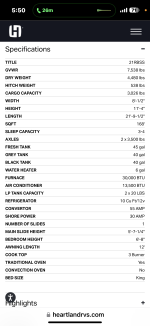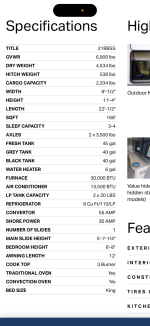The actual weight isn't my concern, I know I'll be well under. I just need to check with my insurance broker to be sure I'd be covered if an accident occurs and the trailer sticker says it's POTENTIALLY higher than my tow capacity. I've heard that you can be charged and insurance can refuse to pay in that scenario.
one hears a lot of Sh*+ that NO ONE HAS EVER HEARD of actually happening..... because its going to be an odd day that anyone who has a care is intentionally, grossly overloading their RV, and towing with a grossly under rated vehicle, to the point that it is inherently unsafe for public roads... (YES, it does happen, but not by anyone who actually has a concern about their towing practices)
the law ONLY states that the gvwr MUST be listed on the vehicle.... there are no laws that say it cannot be exceeded. but there are mfg guidelines saying that you should not overload the vehicle past its recommended capacities... there are weight limit laws, but its seldom that an RVer would ever get close to meeting these.... what concerns us is the GVWR of our vehicles.
I will agree that reasonable, common sense should be used, because if a person is recklessly speeding with a grossly overloaded unit, and they are found to be the CAUSE of the accident, THEN your insurable status may be called into question...and so will your driving privilege's....
No accident and no one will even know you were overloaded, anyway..
now that the rant is over, I would recommend a tow vehicle that is well within its capacity to tow the unit, because too much tow vehicle is nearly unheard of, and when you decide to upgrade to a different trailer, you have the capacity to pull it.... its ALWAYS cheaper to do it RIGHT the first time, even if it is more expensive that the "short cut" method....
but if one is on a budget, there are trade offs that have to be made to be able to get what you need... which may mean stretching the capacity limits of the tow vehicle or trailer... which can be safely done if one knows how to load a trailer/tow vehicle, AND knows how to properly drive when towing.... because the towing limits of modern vehicles are conservative...
ANY vehicle can have its GVWR rating changed by the vehicle manufacture at ANY time, depending on the modifications that are made and how much hassle you want to go thru with applications and inspections.... things like tire size, spring size, axle quantity/size, expected speeds, road conditions, driver experience, vehicle weight/construction ALL play into calculating a reasonable tow speed for ALL vehicles, and the manufacture does not have control over some of these, so a conservative number is assigned as the GVWR... its a conservatively calculated legal requirement that only serves as a guideline to follow, for the owner of the vehicle.
you are breaking NO LAWS by overloading your passenger vehicle, UNLESS you are a commercial vehicle, or the extra weight exceeds the weight limits of the axle group in relation to laws set forth by the state to preserve their road conditions.... NOT by what is stated by the mfg, on a tag, on the door of your truck... because again, as a passenger vehicle, you are NOT bound to the laws of a commercial vehicle... farmers, contractors and RV'ers can do mostly what they want until their equipment fails, because the laws dont normally care how you damage or abuse your vehicles on their highways, as long as you dont abuse their highways..



